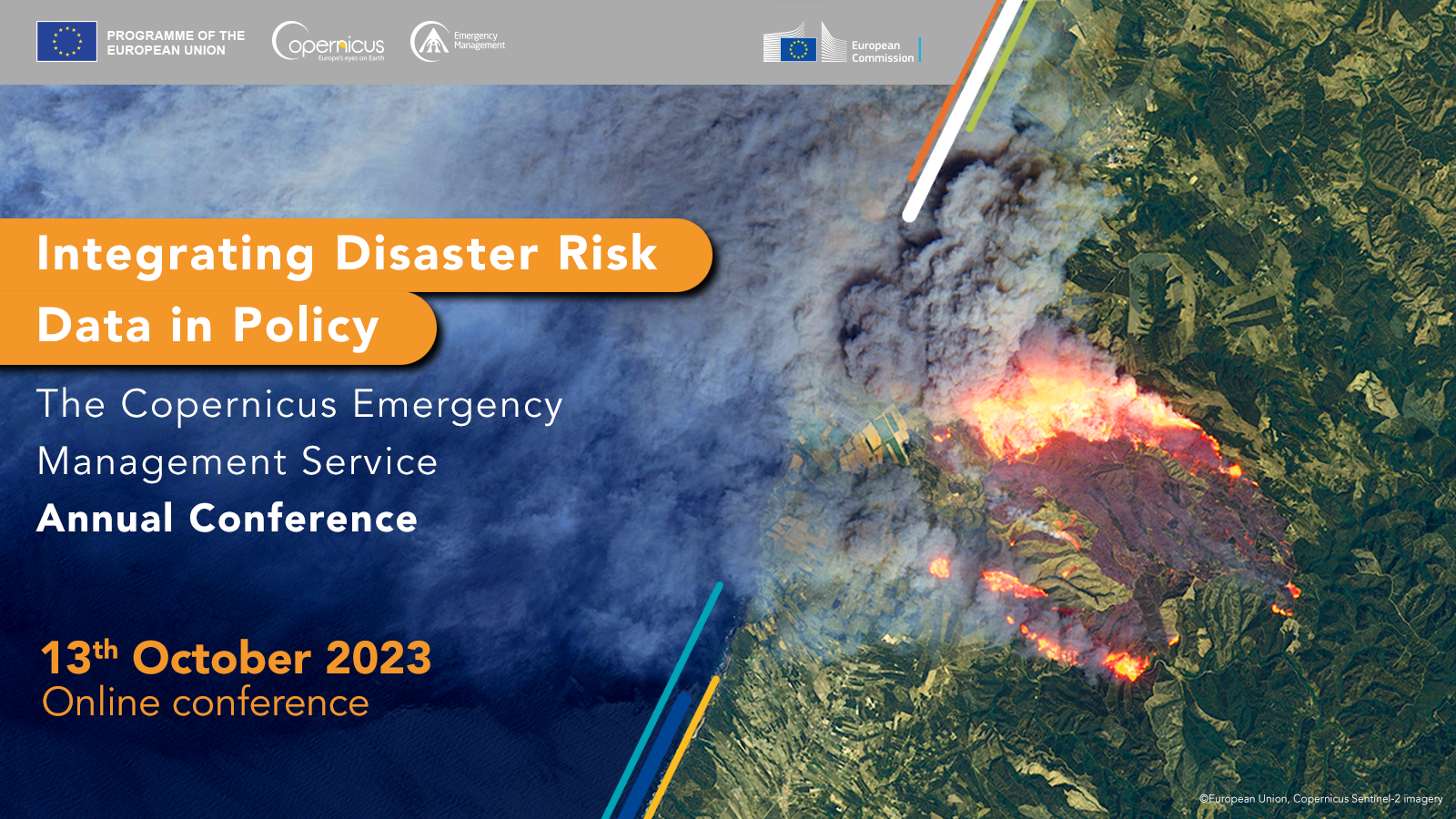On 13 October, on the occasion of the world Disaster Risk Reduction (DRR) Day, the Copernicus Emergency Management Service (CEMS) annual conference took place.
The conference provided attendees an in-depth insight into current and future CEMS activities to support a wide range of policies and help build disaster risk management strategies. This year attendees had the opportunity to take part in hands-on workshops to learn how to access and use data - on droughts, wildfires, floods, emergency mapping, population exposure - from CEMS, which is operated by the JRC can support a wide range of policies and help build disaster risk management strategies.
- During the morning, JRC experts and guest speakers showed how CEMS has been delivering early-warning and monitoring insights on floods, wildfires, and droughts.
Watch the recording
- In the afternoon, practical sessions provided an opportunity for attendees to learn how to use CEMS dashboards to extract personalised data that suits their needs.
- crisis management | natural disaster | disaster risk reduction | wildfire | drought | flood | population dynamics | emergency response
- Friday 13 October 2023, 09:00 (CEST)
- Online only
- Live streaming available
Files
Programme
- 13 Oct 2023, 09:00 - 09:20 (CEST)Welcome
- Tom De Groeve, JRC and Copernicus EMS
- Mauro Facchini, Directorate-General for Defence Industry and Space (DEFIS)
- Carine Hanssens, Directorate-General for European Civil Protection and Humanitarian Aid Operations (ECHO)
- 09:20 - 10:00 (CEST)A disaster just hit. How do satellite and aerial imagery provide support?
- 9:20-9:35 Jean-François Pekel, JRC and Copernicus EMS
- 9:35-9:50 Juan Escalante, Directorate-General for European Civil Protection and Humanitarian Aid Operations (ECHO): A disaster just hit. How do satellite maps provide support? The Emergency Response Coordination Centre (ERCC) perspective.
- Q&A session
- 10:00 - 10:40 (CEST)The increasing importance of early-warning and response systems
- 10:00-10:15 Peter Salamon, JRC and Copernicus EMS
- 10:15-10:30 Justin Ginnetti, International Federation of Red Cross and Red Crescent Societies (IFRC): Importance of early flood warning and response systems from a practical point of view
- Q&A session
- 10:40 - 11:10 (CEST)Break
- 11:10 - 11:50 (CEST)Anticipating and monitoring droughts
- 11:10-11:25 Andrea Toreti, JRC and Copernicus EMS
- 11:25-11:40 Daniel Tsegai, United Nations Convention to Combat Desertification (UNCCD): International Drought Resilience Alliance (IDRA): Overview and objectives
- Q&A session
- 11:50 - 12:30 (CEST)Early warning and monitoring for wildfires
- 11:50-12:05 Jesús San-Miguel, JRC and Copernicus EMS
- 12:05-12:20 Ioannis Papoutsis, National Technical University of Athens (NTUA) and National Observatory of Athens (NOA) and Zisoula Ntasiou, Hellenic Fire Corps: Wildfire danger forecasting at different spatio-temporal scales
- Q&A session
- 12:30 - 13:10 (CEST)Sustainable cities with GHSL
- 12:30-12:45 Thomas Kemper, JRC and Copernicus EMS
- 12:45-13:00 Robert Ndugwa, United Nations Human Settlements Programme (UN-Habitat): Applications in support of urban trends monitoring
- Q&A session
- 13:10 - 13:30 (CEST)Closing remarks
- 15:00 - 15:05 (CEST)Welcome to the plenary
- 15:05 - 16:00 (CEST)How to access and use CEMS data, maps and dashboards
- 15:05-15:30 Session 1
Breakout rooms - 15:35-16:00 Session 2
Breakout rooms
The same five breakout rooms will be run twice in the two sessions specified above. Please, indicate your breakout room preferences during the registration.
- Breakout room 1: From river flows to flood maps – Copernicus EMS flood data
Facilitator: Peter Salamon, JRC and Copernicus EMS - Breakout room 2: Drought data analysis – the importance of time
Facilitator: Davide Bavera, Arcadia SIT s.r.l. - Breakout room 3: Understanding and navigating geospatial maps in response to a disaster
Facilitator: Pietro Ceccato, JRC and Copernicus EMS and Guido Di Carlo, Seidor Italy s.r.l. - Breakout room 4: Keeping a watchful eye on the forest fires through data
Facilitator: Duarte Oom, JRC and Copernicus EMS - Breakout room 5: From space to the streets: mapping human presence on Earth
Facilitator: Michele Melchiorri, JRC and Copernicus EMS
- 15:05-15:30 Session 1
Practical information
- When
- Friday 13 October 2023, 09:00 (CEST)
- Where
- Online only
- Who should attend
- Policy makers, media, researchers, practitioners, general public
- Languages
- English
- Organisers
- Joint Research Centre | Copernicus EU
Description

You're invited to a unique event showcasing how the Copernicus Emergency Management Service (CEMS) helps raise awareness of natural hazards, contribute to disaster risk strategies or help strengthen policy.
While crafted with policy officers in mind, this event will also offer valuable information for media, researchers, practitioners and others looking for ways to integrate disaster risk management (DRM) data in their work activities and justify its importance.
During interactive morning workshops JRC experts will show how CEMS has been collaborating with EU DGs, Member and Participating States - and the international community - by delivering early-warning and monitoring insights on floods, wildfires, and droughts.
They will also share how detailed, high-resolution emergency maps are helping to assess risks, prepare and react to disasters like earthquakes, cyclones, and landslides, among others. And how CEMS systems help identify hazard-vulnerable populations and support resilient urban planning.
Guest speakers will also join to share how they have/are benefiting from CEMS products/services.
In the afternoon, you'll be able to join hands-on workshops and learn how to source, personalise and use CEMS data.
The morning session is open to all via webstreaming, while it is compulsory to register to attend the afternoon session.
Background information:
- The Copernicus Emergency Management Service (CEMS) is part of Copernicus, the European Union's Earth observation programme.
- CEMS watches over Europe and the rest of the world to detect (signs of) disasters by using and modelling satellite information and ground observations.
- Scientists working at the European Commission’s Joint Research Centre are responsible for implementing CEMS.
Contacts
General contact
Event coordination team
- Name
- Event coordination team
- Organisation
- Joint Research Centre
- JRC-EMS
 ec [dot] europa [dot] eu
ec [dot] europa [dot] eu
